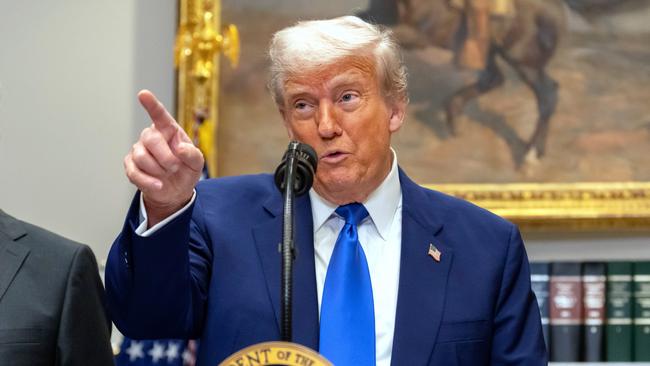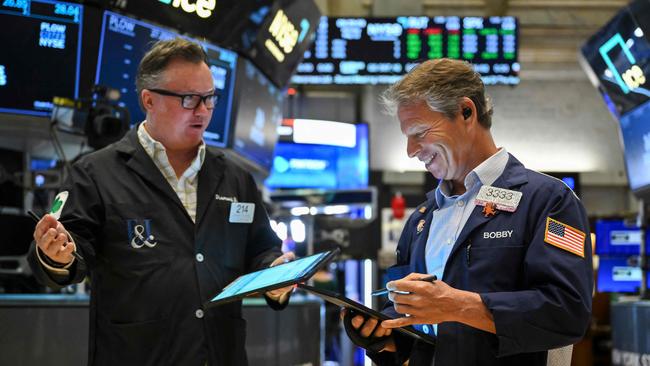Donald Trump’s trade war ceasefire lifts stocks and may curb rate cuts
Investor confidence grows as the US and China pause their trade war but traders are slashing their rate cut expectations.

The arrival of a truce in the trade war betwee the US and China stoked confidence of a longer-term deal between the two superpowers.
But the market’s enthusiasm also prompted traders to slash expectations for RBA rate cuts.
The S&P/ASX 200 rose 0.4 per cent to 8269 points, the highest point since late February, while the All Ordinaries rose 0.5 per cent as investors bet peak trade wars are at an end. Healthcare, technology and energy stocks lead the charge, with Woodside surging 3.7 per cent and Santos climbing 2.9 per cent. Gold miners, consumer staples and real estate stocks slumped as investors embraced the riskier mood.
The local sharemarket followed strong gains in the US that saw the S&P 500 rocket 3.3 per cent and the tech-heavy Nasdaq Composite surge 4.3 per cent after the US and China announced they would both cut tariffs for at least the next 90 days. US tariffs on Chinese goods will go down to 30 per cent, from 145 per cent, while China will slash its retaliatory tariffs on US goods to 10 per cent, from 125 per cent.
“We’re not looking to hurt China … the relationship is very, very good,” President Donald Trump said about the trade deal.
Bell Asset Management chief investment officer Ned Bell said the trade ceasefire had dashed the hopes of material rate cuts in the second half of the year but that the 90-day reprieve would be very good for the US consumer. He expects a longer-term deal to be done within the next three months and says the worst is over in the trade war between the US and China.
“It’s highly unlikely that after 90 days it’s going to rubber band back up to those very high numbers, I think they’ll end up doing a deal with numbers pretty similar to what they’ve just announced,” Mr Bell told The Australian.
“This (90-day deal) takes a huge amount of pressure off the US consumer and the tariff-related inflation that would have borne down on them. So the foot been taken off the throat of the consumer and that’s pretty meaningful,” he said.
The tariff truce has also prompted the market to slash expectations for a series of rate cuts this year.
CommSec chief economist Ryan Felsman said he expects the Reserve Bank redraw its forecasts.
“The market is still pricing in a rate cut for next week, but the aggressiveness around the profile for the rest of the year has probably eased back a bit. The tariff deal could see the RBA ease off a bit on the rate cuts,” Mr Felsman said.

Prior to the US-China trade announcement, the market had been pricing in four rate cuts this year. The RBA next meets on May 19-20, with a cut still 100 per cent priced in at this stage.
A more muted easing cycle would be a positive for Australia’s banks, Mr Felsman added. By the close, the big four lenders were mixed, with Commwealth Bank down 0.62 per cent, Westpac up 1.8 per cent, National Australia Bank down 0.22 per cent and ANZ trading ex-dividend, down 2.4 per cent.
Life360 was among the biggest gainers for the session, up 14 per cent to $27.18 after a positive earnings date for the family tracking app, while other big movers included Zip, up 8.8 per cent, Clarity Pharmaceuticals, up 15 per cent and Corporate Travel gaining just shy of 10 per cent.
Energy stocks and iron ore miners surged as oil rose and iron ore pushed higher toward the $US100 mark.
Safe-haven gold miners were the biggest decliners as the gold price slumped 2.7 per cent. Northern Star fell 4.6 per cent to $18.31, Evolution Mining tumbled 5.3 per cent to $7.87 and Perseus Mining fell as much as 10 per cent to $3.20 before paring some of the losses to finish the session down 7.9 per cent at $3.28.
Wilson Asset Management portfolio manager Matthew Haupt said the gold price now looked like it had peaked. At its highs, the yellow metal was trading at $US3500 an ounce in late April. On Tuesday it was trading at $US3262 an ounce. The portfolio manager said WAM had been progressively selling down its position in gold miners in recent weeks as the price pushed higher.
Consumer staples slid 2 per cent as investors shunned defensives, while the technology sector soared 3.3 per cent and energy stocks gained 3 per cent as the oil price rose.
The US dollar jumped as safe haven currencies declined sharply. The Australian dollar slipped to US63.55c, but could move again tonight on the latest inflation report out from the US. A benign outcome is currently priced in for the April figures as annual growth rates are forecast to be steady but there could be a bigger reaction on the dollar if there’s any surprise either side.
Forager Funds Management chief investment officer Steve Johnson said he was still cautious on the outlook for tariff impacts, and was less positive on the market gains.
“We put a bit of money in a few weeks ago when markets pulled back, and we’re now taking a bit of money off the table, around the edges. We had 10 per cent cash (before April), then we dipped down to 7.5 per cent cash, and now we’re back up to 10 per cent,” he said.
“We’re just trying to play what’s in front of us. But I don’t think we’ve yet seen the true impact of the damage from the trade war. I feel we’re back to what I would call fully priced markets. And we also don’t know what happens with tariffs after these 90 days, so there’s a lot unknown at this stage,” Mr Johnson said.
WAM’s Mr Haupt said the market overall was at fair value but that he still see pockets that are undervalued, including the energy majors Woodside and Santos amid oil price weakness.
“Some of the miners have room to run as well, the likes of BHP, Rio Tinto and Fortescue,” he said.




To join the conversation, please log in. Don't have an account? Register
Join the conversation, you are commenting as Logout